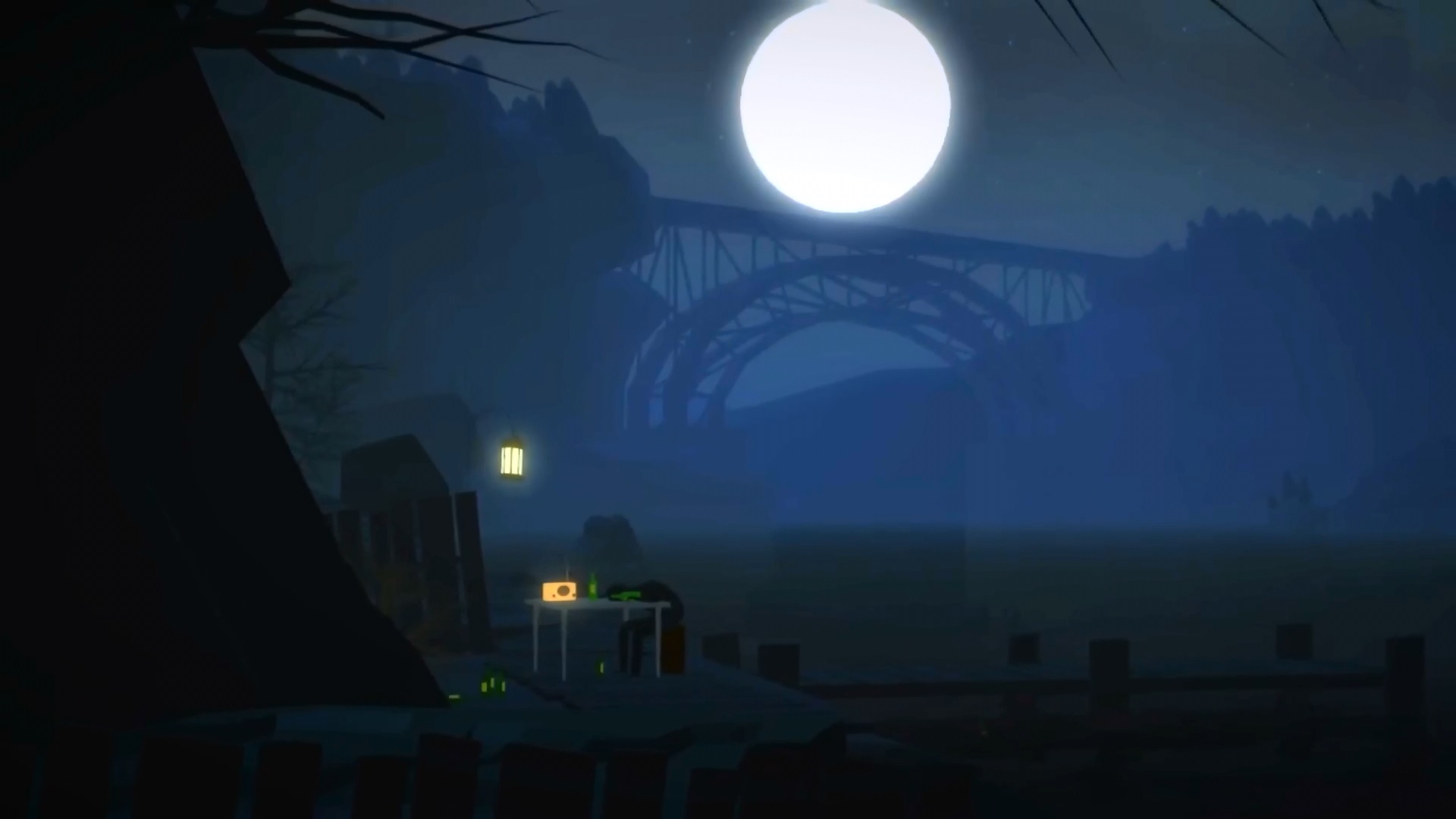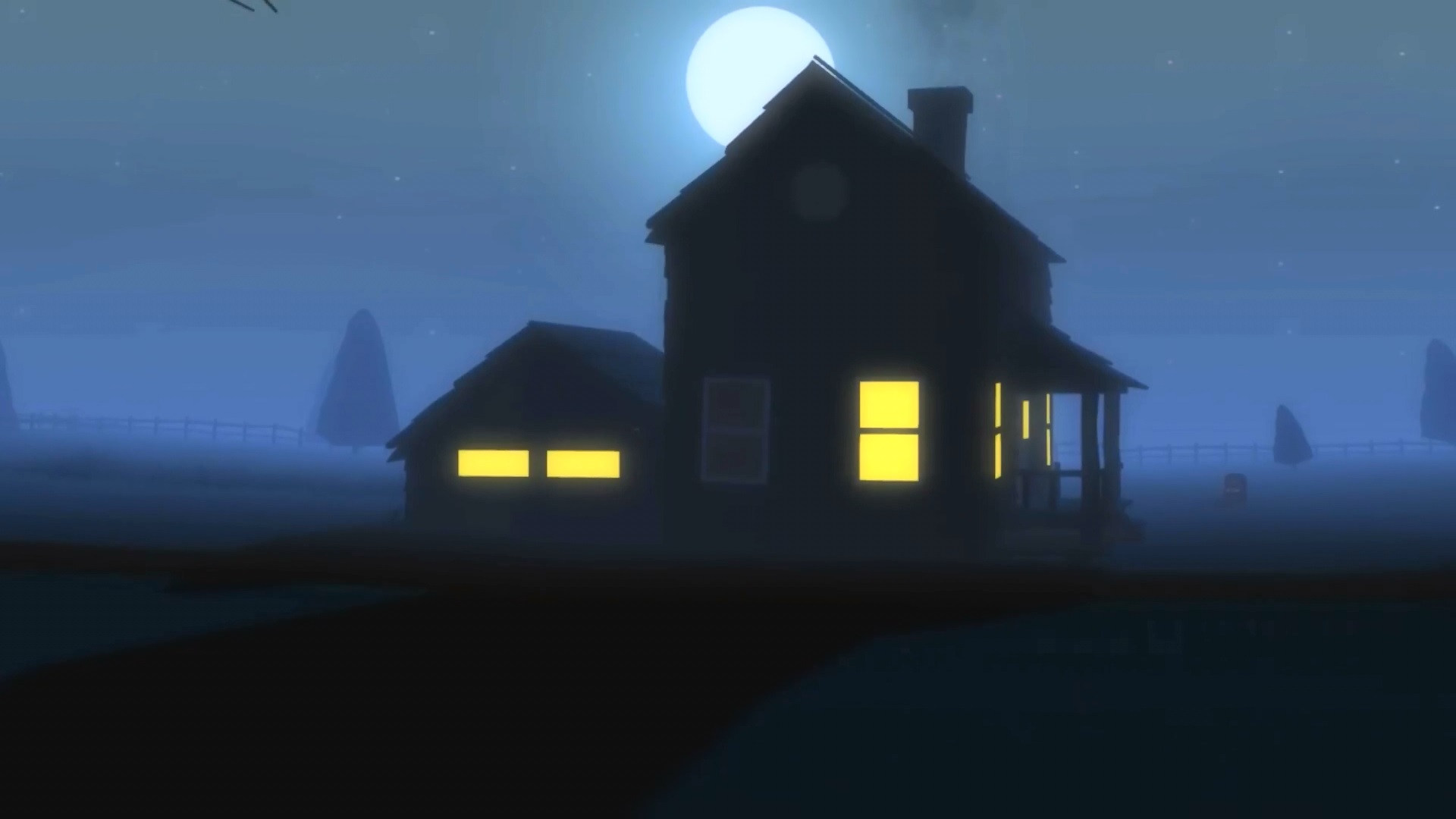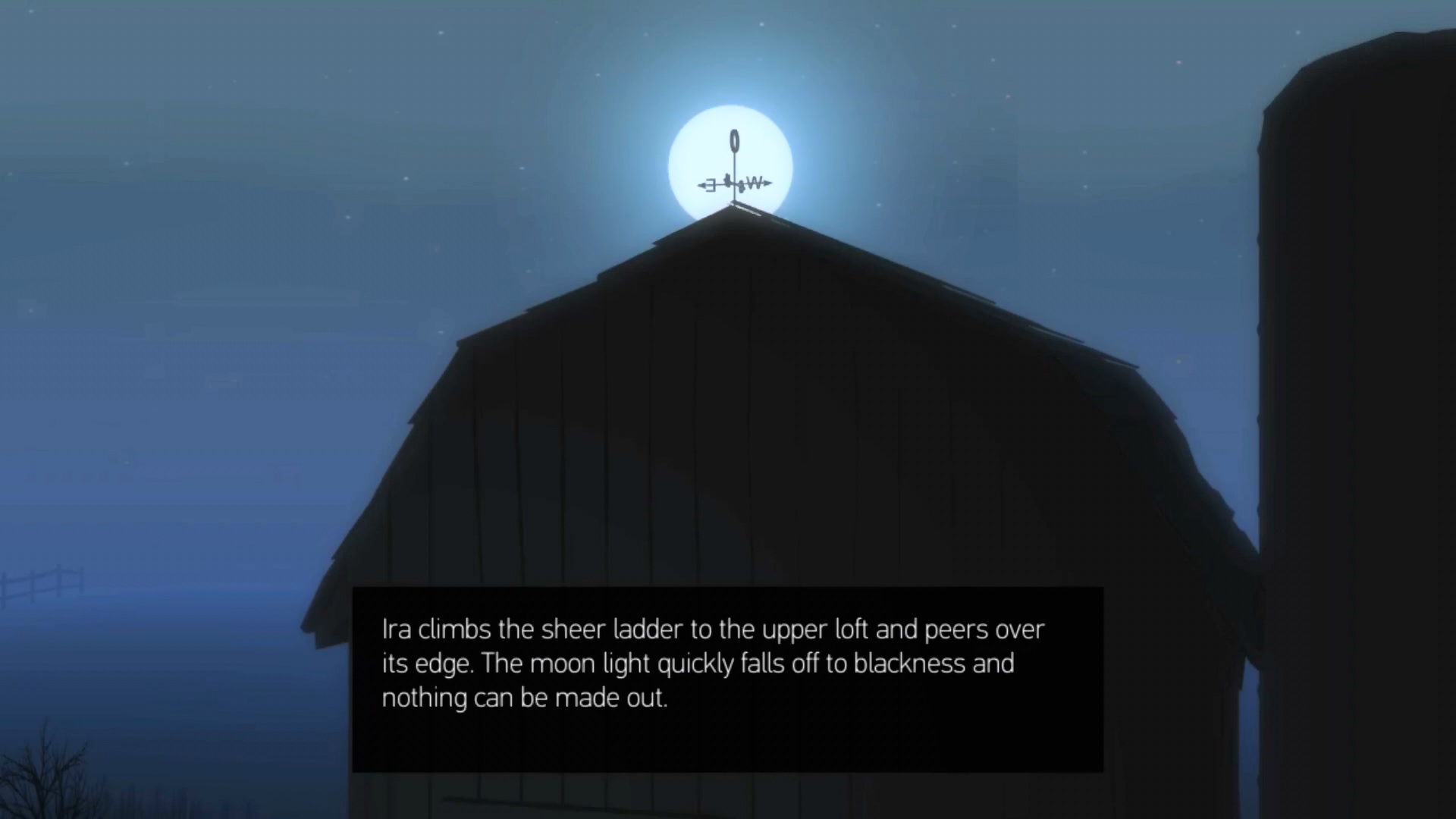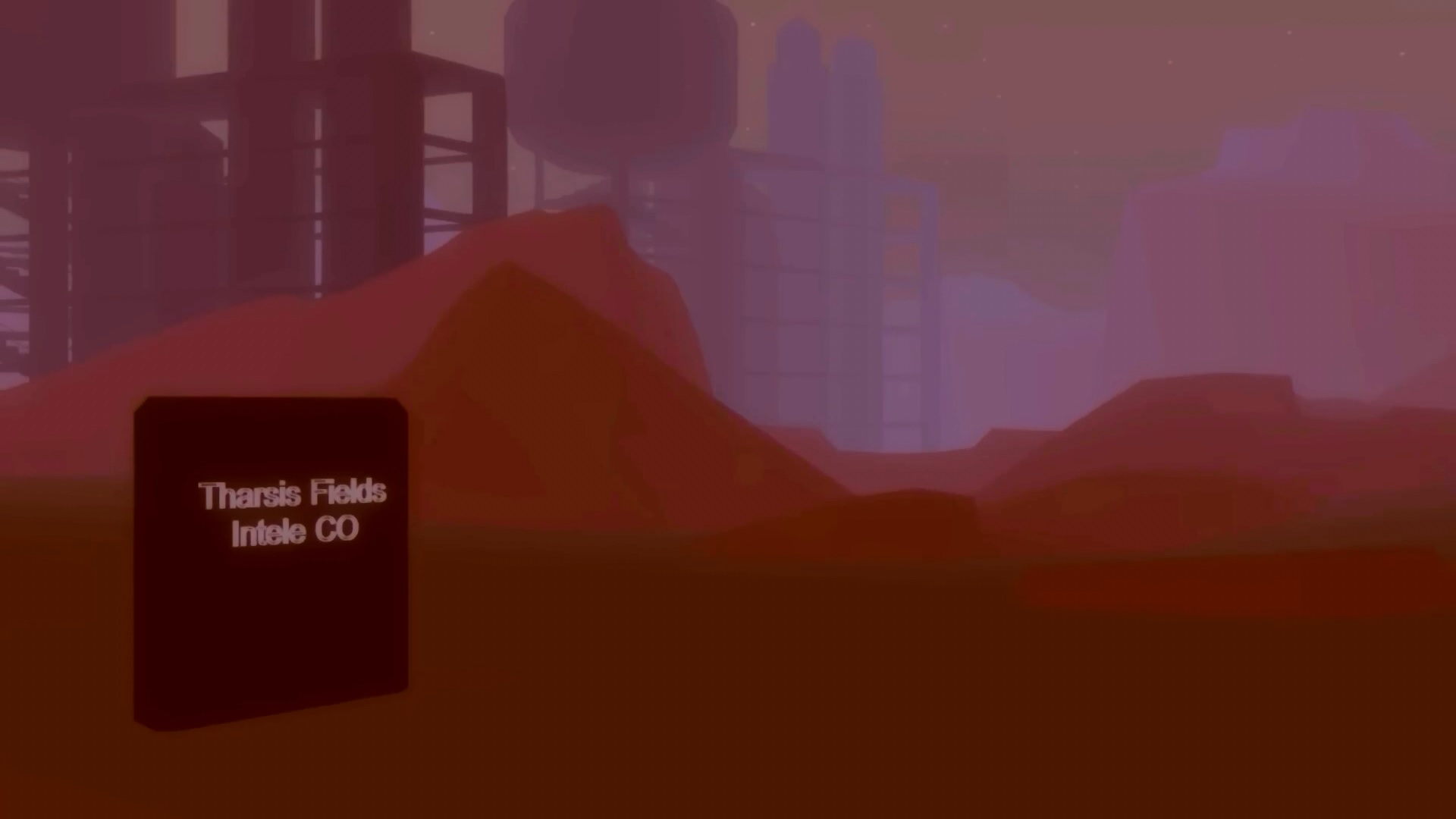What an odd little thing Ira’s demo turned out to be. It didn’t start that way, putting you in the role of a hobo on a train in 1932. Everything seemed normal, at least in the way we think of normal in relation to videogames, when I was talking to this banjo player about where I was heading.
Then he casually mentioned mining on Mars, and everything went sideways from there.
I went into Ira’s demo not knowing a thing about it, and I think I’m better off because of it. I knew it was a point and click, and I knew it had something to do with space travel. The rest was all a mystery to me, much like the atmosphere oozing out of the many dark, gloomy scenes.
Ira reminds me a lot of Kentucky Route Zero. Obviously they’re both adventure games, and they both feature silhouettes and minimalist art, but there’s also a striking resemblance in the tone and atmosphere. In my brief time with the game, I traversed environments enshrouded in darkness and fog, and was grabbed by sudden bursts of strange music, sound effects, and the game’s only voice acting from radios scattered throughout.
What really sells it though is the writing. There’s a lot of dialogue being thrown at you, and the aforementioned banjo player serves as a massive exposition dump. Even still, he and the other characters I met were all fascinating.
The banjo playing cliché was just that; a clichéd subtly creepy wise old man, but the creepiness wasn’t a fact that was paraded about like so many writers tend to do with similar characters. While it was all exposition, it was delivered in a way that informed his limited character. Despite the cliché we’ve all seen countless times, it came across as fresh because he wasn’t defined by the stereotypes you’d expect from such a character (banjo not withstanding), but rather how he spoke.
Ira’s father is even better. He’s a much more nuanced character, and the dialogue choices you make while talking to him will guide how exactly you view him as a character. At first you see just some redneck working on a car, but that quickly changes into a conflicted father looking out for his family who’s pissed off at the big business forcing him back to Mars. There’s a subtle tension in the air as it dawns on you that he might actually prefer to be away from you and his sick wife.
It’s not the greatest writing in the world by any stretch, but it goes beyond what most games try when it comes to writing characters and dialogue. What appear to be clichés at first are fleshed out into something that looks and sounds real. That’s a big part of what Ira is going for.
I can’t say much about the gameplay, because there wasn’t any, not really. I had two or three dialogue options talking to the banjo player, another three or four talking to the father, and only after ten minutes or so did I get to do anything. I was tasked with simply grabbing a wrench off a wall, and after a strange cutscene showing Ira handing the wrench over, I was sent to the barn to pick something up.
This is where things got strange again, though not in the narrative sense. Instead of going inside and looking for whatever MacGguffin I was there for, the game zoomed in on the barn and went into a third person narration. The screen stayed on the barn and I was told, through several minutes’ worth of text, what was happening inside the barn. Again, it was all well-written from a line by line basis, but I couldn’t help but wonder why the game was breaking the number one rule of writing: show, don’t tell. I had to sit there and read about what was happening without getting to experience it myself, all while looking at the same picture of a barn for several minutes.
I’m not sure if it was Ore Creative, the developers of Ira, going for a sort of novel like narration of the game, but it came across as forced and unnecessary. It’s always better to show the audience what’s happening, especially in an interactive medium like videogames. It could have been an issue regarding budget. The game is on Kickstarter after all, writing a bunch of text is cheaper than creating a whole section of a game. Either way, it was lowlight of an otherwise well-presented tale.
After I get the Thingy I was sent to get, I return it to my father and am told to check in on my sick mother. What would otherwise be yet another eye-rolling cliché and a narrative tool, is flipped on its head. Your mother, while sick, is still trying to take care of her family and hold together what seems like a shaky marriage. Mother has the least to say in the demo, but for better or worse, we get a better sense of who she is than anyone else.
She asks you to put a pot on the stove for dinner, and after complete the difficult task of moving a pot two feet from the counter to the stove, you return to the garage to fetch your father. When you enter the garage, things change. Not only is he gone, but so is the car, all of his tools, and indeed everything that was previously there.
We’re introduced to another feature of the game: time jumps. The colony on Mars is shown, as we’re told that father is long gone, and all the lights turn off as the camera goes back to our house. It’s a stark contrast to the barn scene where we were told what was going on. Here, we’re left to infer what happened in the intervening years.
That was my time with the demo. What was lacking in gameplay was made up for in the story and character interactions. The puzzles were clearly weak due to the fact it was early in the game, and it was all a pre-alpha anyway. That being said however, it’s equally clear that this is going to be the kind of game that places narrative over gameplay anyway.
The presentation of the pre-alpha demo was easily on par with Indivisible. It was incredibly well made, and whether or not you enjoyed its contents, you have to at least acknowledge that Ore Creative has the capability of making a solid title. If you’re interested in a second look, go ahead and read Serena’s impressions with the demo, or watch my let’s play if you’re looking for terrible accents I used while reading the text.
http://www.youtube.com/watch?v=Phhd3mjOStA







[…] Ore Creative first brought their point-and-click adventure Ira to Kickstarter they were seeking $68,200 to create the whole story. They later revised their […]